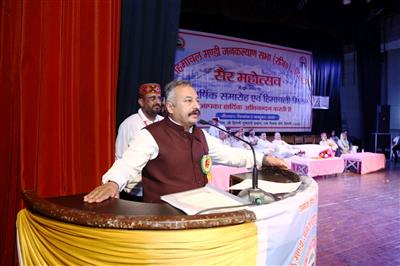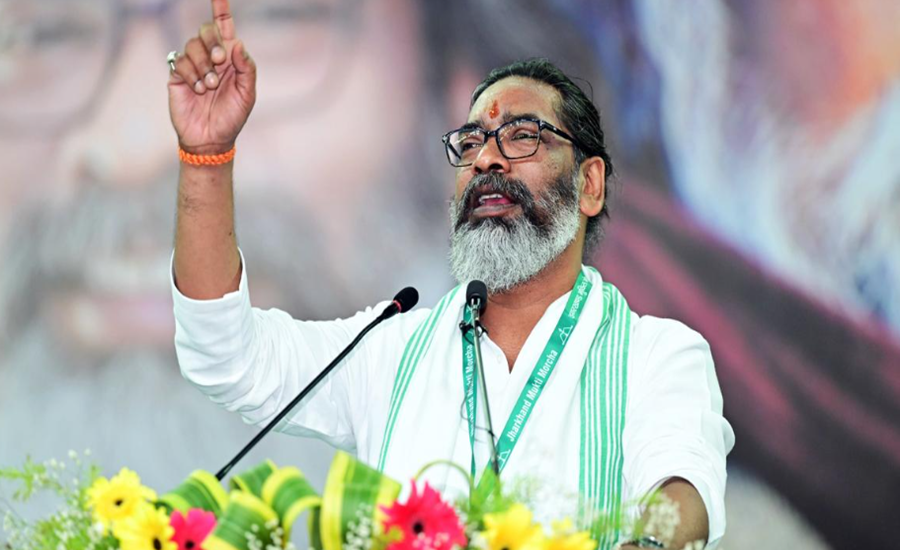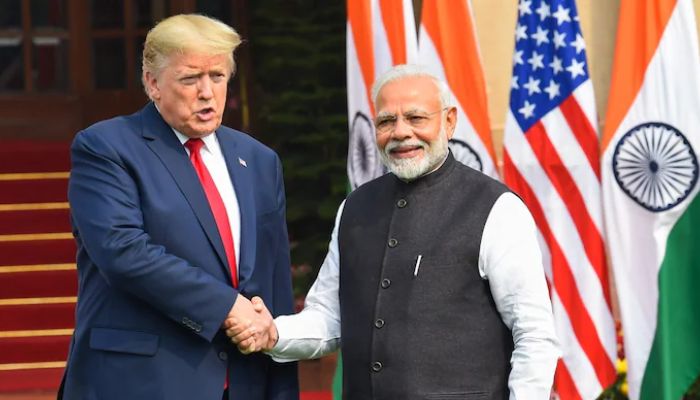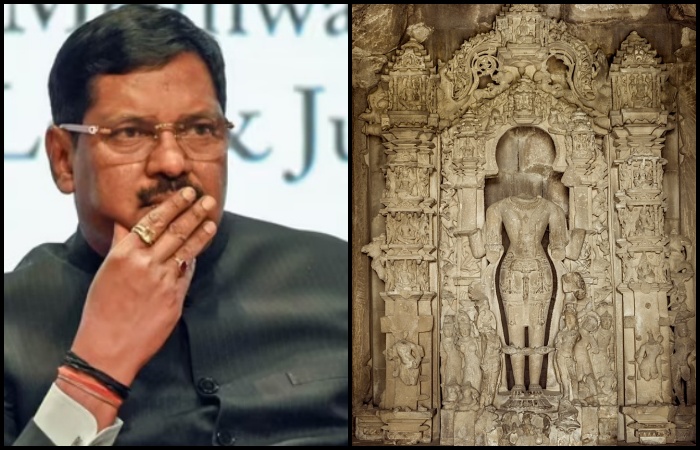Simi Garewal’s defence of Ravana and mockery of Dussehra: The Indian Left’s selective attacks on Hindu traditions and its trivialisation of women’s sufferings
Every Dussehra, effigies of Ravana go up in flames across India. For millions of Hindus, the ritual is not just a spectacle but a reaffirmation of the timeless principle that dharma triumphs over adharma. It is a civilisational reminder that evil, no matter how powerful or sophisticated, will eventually be defeated by righteousness. But this year, washed-up actress and producer Simi Garewal chose to use the occasion to trivialise the ritual and, by extension, mock the very foundation of Hindu cultural memory. In an “open letter” to Ravana, she wrote that his behaviour should be reclassified from “evil” to “slightly naughty,” going on to argue that apart from kidnapping Sita, Ravana actually treated her better than many women are treated in today’s world. She even suggested that burning his effigy was merely the “in-thing.” Dear Ravana…Every year, on this day, we celebrate the victory of good over evil.. But.. technically.. your behaviour should be re-classified from "Evil" to "Slightly Naughty". After all, tumne kiya hi kya tha? I agree you kidnapped a lady in haste… But.. after that.. you… pic.twitter.com/GqIKNA2fCW— Simi_Garewal (@Simi_Garewal) October 2, 2025 At first glance, her tweet might appear like harmless satire. But on closer inspection, it reflects a dangerous mindset that has become increasingly common among India’s self-styled liberal elite: a tendency to lampoon Hindu practices while trivialising crimes against women, all under the garb of “humour.” The trivialisation of abduction One of the most disturbing aspects of Garewal’s post is her casual dismissal of Ravana’s central crime, the abduction of Goddess Sita. She calls it something done “in haste” and then adds that because Raavan provided Sita with food, shelter, and security guards, his act should be viewed with nuance. This is not nuance; this is a rationalisation of crime. Kidnapping a woman is not a “slight mistake” to be excused by subsequent hospitality. By that logic, any abductor could be let off as long as he treats his captive “well” after committing the crime. Imagine applying this logic in real life. Would we excuse a kidnapper today if he provided his victim with good meals and comfortable housing? Of course not. In attempting to be witty, Garewal ends up trivialising a woman’s right to autonomy and safety. Ironically, the very feminism she might claim to espouse demands that crimes like abduction be condemned without qualification. Yet here, in her eagerness to take a swipe at Hindu tradition, Garewal chooses to look at Raavan through rose-tinted glasses. Selective ‘feminism’ and the Hindu punching bag There is also a deeper question that her tweet raises: why do such sermons and reinterpretations always target Hindu practices? Would Simi Garewal ever dare to write a tongue-in-cheek “open letter” to figures from other religions? Would she write, for example, that marriage between a middle-aged man and a six-year-old was not “evil” but merely “slightly inappropriate”? Would she satirise atrocities recorded in Islamic or Christian history with the same flippancy? We have already seen, during the Nupur Sharma episode, what happens when someone dares to state inconvenient facts bluntly. Sharma was not met with debate or rebuttal, but with a coordinated campaign of vilification that quickly spilled from the online world onto the streets. Across Indian cities, mobs raised chilling slogans of “Sar Tan Se Juda” or open calls for beheading, simply because she voiced truths that sections of the Muslim community chose to interpret as an insult to Prophet Muhammad. Nevertheless, Hinduism has become the safest punching bag for Bollywood liberals. Criticise Hindus, mock their gods, lampoon their festivals, and there will be applause from the usual echo chambers. But touch upon practices or histories of other faiths, and the same liberals will either turn defensive or maintain a studied silence. This selective outrage is not just hypocrisy; it is cowardice dressed up as courage. True feminism, true humanism, and true progressivism would challenge injustices wherever they exist, not just where it is safe and fashionable to do so. The civilisational purpose of burning Ravana effigies Garewal also seems to miss the larger point of why Hindus burn Ravana’s effigy every year. It is not about sadism or cruelty towards a mythical character. It is about teaching generations of Indians a moral lesson: that arrogance, lust, and tyranny, no matter how mighty they appear, will ultimately be defeated. In every society, rituals and symbols exist to reinforce moral codes. Western societies celebrate the defeat of dictators or revolutionaries through memorials, parades, and reenactments. In America, fireworks on the Fourth of July symbolise victory over colonial rule. In France, Bastille Day commemorates the storming of a prison. No one mocks these traditions as “in-thing” fads. Yet when Hindus burn Raavan,



Every Dussehra, effigies of Ravana go up in flames across India. For millions of Hindus, the ritual is not just a spectacle but a reaffirmation of the timeless principle that dharma triumphs over adharma. It is a civilisational reminder that evil, no matter how powerful or sophisticated, will eventually be defeated by righteousness.
But this year, washed-up actress and producer Simi Garewal chose to use the occasion to trivialise the ritual and, by extension, mock the very foundation of Hindu cultural memory. In an “open letter” to Ravana, she wrote that his behaviour should be reclassified from “evil” to “slightly naughty,” going on to argue that apart from kidnapping Sita, Ravana actually treated her better than many women are treated in today’s world. She even suggested that burning his effigy was merely the “in-thing.”
Dear Ravana…
— Simi_Garewal (@Simi_Garewal) October 2, 2025
Every year, on this day, we celebrate the victory of good over evil.. But.. technically.. your behaviour should be re-classified from "Evil" to "Slightly Naughty".
After all, tumne kiya hi kya tha? I agree you kidnapped a lady in haste… But.. after that.. you… pic.twitter.com/GqIKNA2fCW
At first glance, her tweet might appear like harmless satire. But on closer inspection, it reflects a dangerous mindset that has become increasingly common among India’s self-styled liberal elite: a tendency to lampoon Hindu practices while trivialising crimes against women, all under the garb of “humour.”
The trivialisation of abduction
One of the most disturbing aspects of Garewal’s post is her casual dismissal of Ravana’s central crime, the abduction of Goddess Sita. She calls it something done “in haste” and then adds that because Raavan provided Sita with food, shelter, and security guards, his act should be viewed with nuance.
This is not nuance; this is a rationalisation of crime. Kidnapping a woman is not a “slight mistake” to be excused by subsequent hospitality. By that logic, any abductor could be let off as long as he treats his captive “well” after committing the crime. Imagine applying this logic in real life. Would we excuse a kidnapper today if he provided his victim with good meals and comfortable housing? Of course not.
In attempting to be witty, Garewal ends up trivialising a woman’s right to autonomy and safety. Ironically, the very feminism she might claim to espouse demands that crimes like abduction be condemned without qualification. Yet here, in her eagerness to take a swipe at Hindu tradition, Garewal chooses to look at Raavan through rose-tinted glasses.
Selective ‘feminism’ and the Hindu punching bag
There is also a deeper question that her tweet raises: why do such sermons and reinterpretations always target Hindu practices? Would Simi Garewal ever dare to write a tongue-in-cheek “open letter” to figures from other religions? Would she write, for example, that marriage between a middle-aged man and a six-year-old was not “evil” but merely “slightly inappropriate”? Would she satirise atrocities recorded in Islamic or Christian history with the same flippancy?
We have already seen, during the Nupur Sharma episode, what happens when someone dares to state inconvenient facts bluntly. Sharma was not met with debate or rebuttal, but with a coordinated campaign of vilification that quickly spilled from the online world onto the streets. Across Indian cities, mobs raised chilling slogans of “Sar Tan Se Juda” or open calls for beheading, simply because she voiced truths that sections of the Muslim community chose to interpret as an insult to Prophet Muhammad.
Nevertheless, Hinduism has become the safest punching bag for Bollywood liberals. Criticise Hindus, mock their gods, lampoon their festivals, and there will be applause from the usual echo chambers. But touch upon practices or histories of other faiths, and the same liberals will either turn defensive or maintain a studied silence.
This selective outrage is not just hypocrisy; it is cowardice dressed up as courage. True feminism, true humanism, and true progressivism would challenge injustices wherever they exist, not just where it is safe and fashionable to do so.
The civilisational purpose of burning Ravana effigies
Garewal also seems to miss the larger point of why Hindus burn Ravana’s effigy every year. It is not about sadism or cruelty towards a mythical character. It is about teaching generations of Indians a moral lesson: that arrogance, lust, and tyranny, no matter how mighty they appear, will ultimately be defeated.
In every society, rituals and symbols exist to reinforce moral codes. Western societies celebrate the defeat of dictators or revolutionaries through memorials, parades, and reenactments. In America, fireworks on the Fourth of July symbolise victory over colonial rule. In France, Bastille Day commemorates the storming of a prison. No one mocks these traditions as “in-thing” fads. Yet when Hindus burn Raavan, it is suddenly treated as outdated, unnecessary, or worse, cruel.
This is a classic example of applying Western notions of morality to Indian traditions without understanding their context. To call Raavan “slightly naughty” is to erase the moral clarity of the Ramayana, which has been the bedrock of Hindu ethical consciousness for centuries.
Mocking women’s suffering
Another disturbing element in Garewal’s tweet is her sarcastic comment that Ravana’s female security guards were “not too good looking.” This is not just poor taste; it exposes Garewal’s hollow support for feminism, ridiculing women for their looks.
It reminds one of the time Swara Bhasker criticized Rajput women performing jauhar to save themselves from being raped by invading armies. In both cases, the suffering of Hindu women is trivialized. Such grotesque distortions of feminism do not empower women; they belittle their historical struggles and reduce their pain to punchlines.
The abduction of Sita is not a fictional anecdote to be laughed at; it is a symbolic story of how women’s dignity is to be defended at all costs. Lord Rama’s war against Ravana is not about male ego; it is about the principle that no man has the right to abduct or violate a woman, no matter how powerful he is. Garewal’s attempt to turn this into a joke only undermines that message.
Ravana: The scholar tyrant
Garewal also points out that Ravana was “more educated than half of our Parliament.” This, too, is a shallow reading. Yes, Ravana was a learned scholar, a master of the Vedas, and a great devotee of Lord Shiva. But knowledge without humility is dangerous. The Ramayana itself demonstrates that learning and wisdom mean nothing if they are corrupted by arrogance and lust.
In fact, this is precisely why Ravana is burned every year, not because he lacked knowledge, but because he abused it. To argue that his education makes him less evil is like arguing that dictators who built roads and universities should be excused for their tyranny. Education and power, when misused, are not virtues; they are weapons of oppression.
Why liberal taunts must be called out
At its core, Garewal’s post is not just about Ravana. It represents a larger pattern in India’s intellectual and cultural discourse, where Hindu traditions are regularly mocked, undermined, and guilt-tripped through Western moral frameworks.
By calling Ravana “slightly naughty,” Garewal reduces a civilisational moral struggle to a joke. By trivialising Sita’s abduction, she insults women who have fought against oppression across centuries. By suggesting that burning Ravana is just an “in-thing,” she ignores the deep moral purpose of the ritual.
The truth is this: Hindus do not need lectures from Bollywood celebrities about how to interpret their traditions and rituals. What Hindus need is respect for their faith, the same respect that is automatically extended to other religions.
What Dussehra symbolises
Dussehra is not a festival of hate; it is a festival of moral clarity. Ravana effigies burn not because Hindus are vengeful, but because society needs the reminder that pride, arrogance, and adharma will always meet their end. To call this “in-thing” or to paint Ravana as a misunderstood gentleman is not just ignorant; it is an insult to the civilisational wisdom of this land.
Simi Garewal’s tweet is not clever satire. It is a reflection of a twisted mindset that belittles Hindu rituals, trivialises women’s suffering, and indulges in selective sermonising.
And that is why, year after year, Ravana will continue to burn. Because some ideas, no matter how much Bollywood liberals try to dress them up, must be destroyed for good.




























































































































